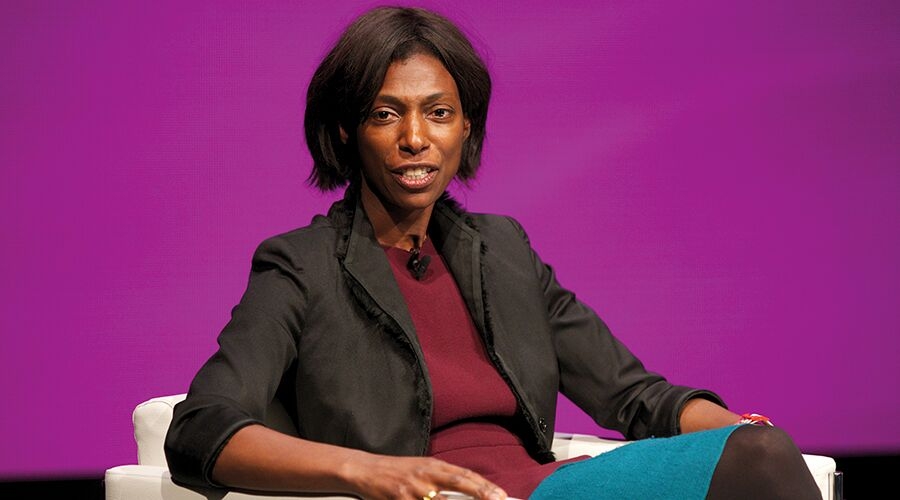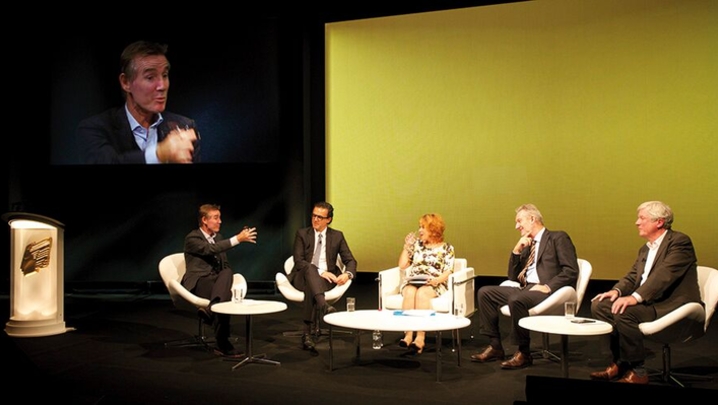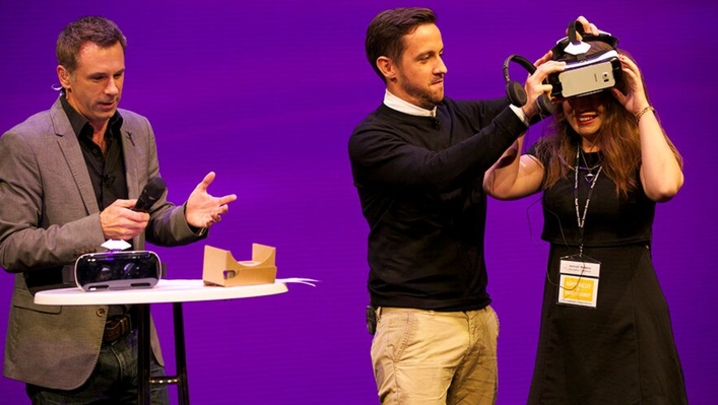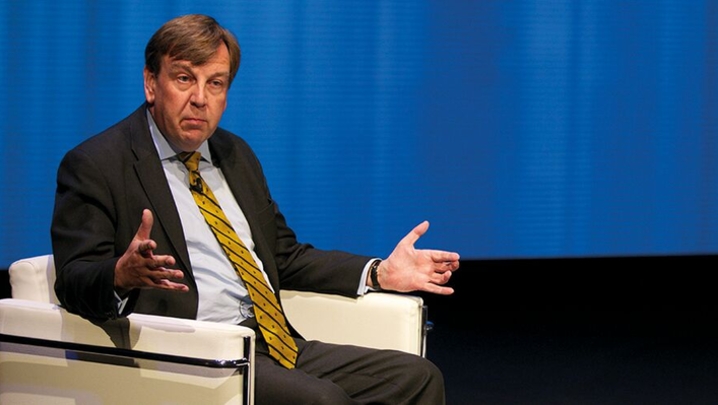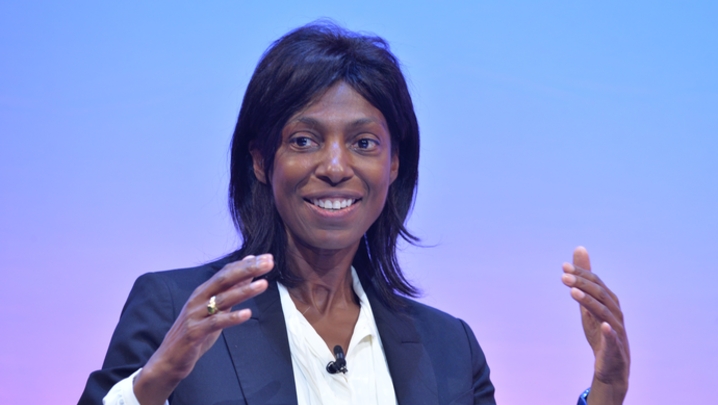Cambridge Convention 2015 Session Nine: The regulator’s Chief Executive, Sharon White, described herself as a child of television in an entertaining encounter with Stewart Purvis
Audiences at the Cambridge Convention have grown accustomed to Ofcom chiefs who either “don’t think television is as special as people who work in television think it is” (Stephen Carter), or who are not averse to regulating more of the BBC (Ed Richards).
So it was refreshing when the regulator’s new Chief Executive, Sharon White, in her first interview at an industry event since being appointed, appeared to show she was less expansionist (see box on page 35) than her predecessor and said those who worked in television were “super special”.
White was not intent on overt flattery, though – her comment about programme-makers came in response to a clip her interviewer, Stewart Purvis, showed of Carter telling Cambridge 2003 that they were not as special as they thought they were.
Purvis wondered if she agreed. She did not, saying she would call them “super special, if that’s a phrase”.
“It’s fantastic to be here. I’m a TV kid,” enthused White, adding that it was “slightly embarrassing to think about how much TV” she watched when she was younger.
“When I got to university [Cambridge], I didn’t know what it was like to work without having either EastEnders or another soap on in the background,” she laughed.
In an entertaining session, White said – surprisingly, for those used to hearing Ofcom enthuse more about areas of the media beyond television – that, at Ofcom, “television is really important”.
“This is a sector that is the second biggest in the UK. You can feel the vibrancy of the industry. It’s a pleasure for so many people. As a regulator, what’s really interesting is… that TV content is thriving hugely.”
White continued: “Who would’ve thought that, even two or three years ago”, telecoms companies would be setting up TV channels?
Purvis said he was probably one of the few people who had recognised
White when she attended the Edinburgh International Television Festival in August.
The Ofcom CEO said she had “had a ball” at Edinburgh. She made most of the key sessions, sitting at the back and observing.
She was surprised, “apart from how young everybody was”, by “how much the BBC discussion had dominated”. Despite having some expertise regarding the licence fee – in her “previous life” in the Treasury, she was lead advisor on public spending – White had not expected the BBC debate to be so pervasive.
In addition to enthusing about television, White admitted that, since she began at Ofcom, she has become more of a digital devotee than many other 48-year-olds.
“I’m going to ask you a question Ofcom asked the public,” said Purvis: “Which one of these things that you use almost every day would you miss the most? Games player, tablet, books, mags and newspapers, radio, PC, laptop, mobile phone or TV set?”
“By some very large margin, my mobile phone,” said White with a grin. “I have become one of those quasi-
18-year-olds who wakes up in the morning and the first thing I do before I check if my husband’s still there is I check my phone, Twitter feed and Ofcom alerts. I’ve definitely got more digital in the past six months.”
Purvis told her that pretty much everyone who saw White’s appearance before the Commons Culture, Media and Sport Committee was “impressed” when she answered all the questions with nobody passing her notes.
She noted to laughter that being interesting at a select committee is not always necessarily a sign of success.
Purvis asked her why, when the regulator had said in July, apropos the terms of trade, that “it is too early to assess the full impact of consolidation and we will keep this area under close review”, two months later John Whittingdale wanted Ofcom to “assess the full impact”.
White said she and the Secretary of State had not had a “direct conversation” about it, but had exchanged letters. It was “worth going back not just to the bottom line but also the analysis”.
“We said in the statement that, on the one hand, it’s a great opportunity…there’s more money going into the system – if you look at 15 years ago, there were real issues about the sustainability of some of the indies [being] dependent on one or two big hits,” explained White.
“On the other hand, we also said that we’re worried about the lifeblood of the SMEs. At the moment, we’re not ringing the warning bell… but it’s an area that we want to watch.
“And, I think, on the back of that, the Secretary of State said: ‘I want to have a fundamental review earlier than we would have done otherwise’.”
She challenged Purvis’s assumption that Whittingdale called for the review because the BBC wants to build its international business and “to do that it needs as much intellectual property as possible”.
“I think you’re probably further ahead than I am on this,” said White. She thought the Secretary of State “doesn’t have a pre-determined outcome”, and “actually, it seems to be an open process… I’m not going to be drawn into judgements before we’ve done the serious work.”
" [The media] is actually less diverse than Whitehall and even the Treasury"
Similarly, on the prospect of the possible privatisation of Channel 4, White said the broadcaster appeared to be in “rude health”. She added that it was “not clear to me that the question of privatisation is on the agenda. And, certainly, every time John’s asked on the subject, he’s gone out of his way to praise the health” of Channel 4.
“I’m not sure this is anything more than a hypothetical issue,” was White’s intriguing observation.
Responding to a question from the floor about Ofcom’s relationship with the Government, White said that the regulator felt “very much” independent from Whitehall.
She said that it was slightly ironic, as her husband – who runs the Office of Budget Responsibility – had been having similar conversations with the Treasury.
She argued that “independence stems from being evidence-based and the quality of the analysis”.
Ofcom must operate “without fear or favour because you live or die as a regulator by your independence, this is absolutely fundamental for us.”
After Purvis pointed out that few in the room were of Afro-Caribbean descent, White was clearly keener to talk about media diversity than her predecessors had been.
White said that, having worked in international finance and the Treasury – “where the number of Etonians around on the Treasury Board has been rather higher than it used to be and even [than it was when] I was at Cambridge” – the media “is actually less diverse than Whitehall and even the Treasury”.
She suspected that the reasons included the fact that there was “not a clear career path”. As a gender champion for the Civil Service, White realised that industries needed to find a way “to widen in a transparent and fair way the talent that comes in” by going out into schools and having conversations with young children to encourage them to think “it could be me”.
White also suggested that internships could be advertised. Responding to a question from Campaign for Broadcasting Equality Chair Simon Albury about why Ofcom had not done more before on diversity, White assured him that it was now a “big priority” for the regulator.
She argued that “we have a statutory duty to support opportunities in training and the economy of the industry” but said that “collective endeavour” from the media was important, too.
Additionally, White believed that there was a “compact with the licence-fee payer” that society should be “reflected back in the programming” for the UK’s “cultural well-being”.
Former Luther Executive Producer Phillippa Giles asked her if she thought that “something mainstream” had to happen to improve the ethnic make-up of television.
White suggested that, with devolution and the increasing cultural diversity of people in the UK, the issue was “not just about programming”, it was about doing things in a “non-stereotypical way”.
This is a mantra she seems set to apply to Ofcom.
Sharon White, Chief Executive of Ofcom, was interviewed by Stewart Purvis CBE, Professor of Television Journalism, City University. The session was produced by Dan Brooke.
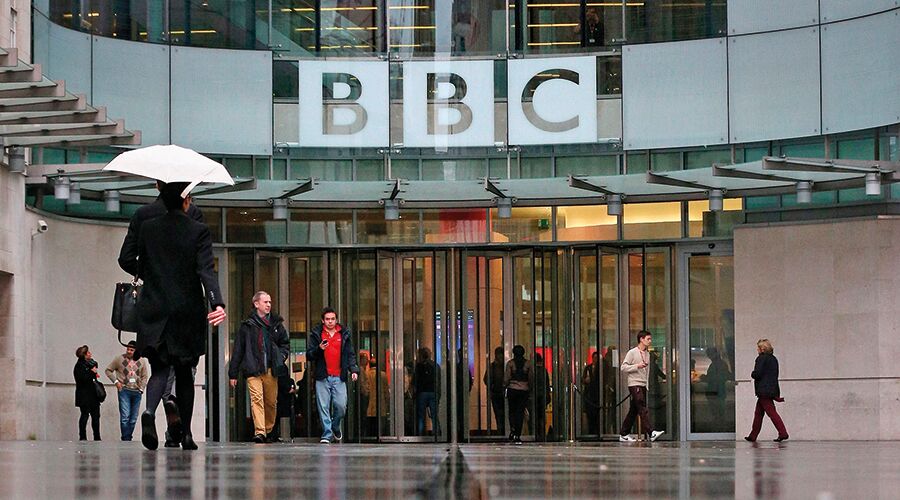
Could Ofcom take full responsibility for BBC governance?
Who should regulate the BBC if the BBC Trust were abolished is a key question to be resolved during Charter review, with some suggesting that it should be Ofcom.
Stewart Purvis asked Ofcom CEO Sharon White about what she meant when she told the Culture, Media and Sport Committee in July that she ‘would put a line in the sand between [regulation] and the core responsibilities of the governance function. That is not a responsibility that we have the competence to discharge.’
‘Why did you say that… bearing in mind that Ofcom Chair Patricia Hodgson, probably knows more about the BBC than anyone in this room?’ asked Purvis. He added: ‘It would be natural for Ofcom to regulate the BBC. Why would you not want to… given all the things that you do already?’
White suggested that there had been some ‘confusion’ over the issue. Her first objective had been to ‘separate out governance or corporate governance’, where ‘you’re overseeing the strategy, you’re supervising the budgets, you’re appointing people’. This could only be done by setting up close to the institution concerned.
She added: ‘Where I start as a regulator is: where does Ofcom already have a good track record and some experience and where do we already have some locus with the BBC?’
The other area, said White, is where Ofcom is called on by the BBC Trust to examine issues such as its impact on the rest of the market. ‘The question you asked is about where the line in the sand is,’ she observed. ‘The thing I would say is, it’s not ultimately our decision, but where I would be uncomfortable [would be] for Ofcom to be deciding the detailed shape and scope of the BBC.’
She said that, even in broadcasting standards, where Ofcom has ‘experience and expertise and a degree of comfort, were we to be asked to take on additional responsibilities… I would not call that a trivial task. As I mentioned to the select committee, the scale of complaints that Tony [Hall] is lucky to receive each year – 350,000 – [must be] compared with the 25,000 complaints that we get about the all the other broadcasters.
‘So, even in an area where we’ve got great people and expertise, it would be a big upscaling of responsibility and resources… the BBC has got a place in British public life like no other broadcaster.’
Ultimately, though, said White, ‘we’ll happily discharge the duties that Parliament gives us’, pointing out that former Deputy Governor of the Bank of England David Clementi had been appointed to review BBC governance and would ‘explore all the options’.
Despite White’s non-expansionist view, a poll of the audience interestingly showed that most people thought Ofcom regulating the BBC was a better option than either the BBC Trust or a new Ofbeeb-style governance structure.

